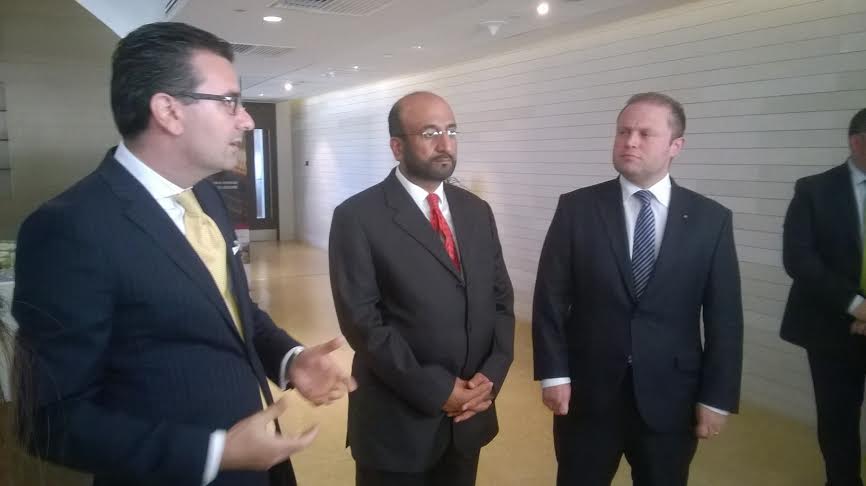
In today’s Malta Independent Alfred Sant reluctantly acknowledges that “negative thinking” is, on balance, a good thing. He says that critics of the government who point out what they think is wrong without constructively presenting alternatives are boring and tedious. But none of that makes them useless. You need negative thinking because out of that springs the effort to think about how to make things better.
Alfred Sant does not acknowledge the philosophical source of this cloudy bomb shell. He’s describing Hegelian dialectic. A way of doing things is confronted by its opposite, its antithesis. Neither side survives the clash but the product, the synthesis, is an improvement. Socialists grow their roots in this idea. Socialism is, in theory at least, a negation of a state of play which is unfair on the downtrodden.
Of course, the problem with Hegelian dialectic is that its proponents assume theirs would be the last challenge ever: that after their turn at changing the order of things, there would be no room for yet another revolution to replace them.
In this morning’s article, Alfred Sant displays the intellectual honesty of acknowledging that the current Labour government is not beyond improvement.
In a way, beyond the thin philosophising, Alfred Sant presents himself in contrast with the dogmatic attitude of his party in government who have spent the last 10 years dismissing any criticism of their conduct, any “negativity”, as a symptom of greed, of partisanship, of envy, or of madness. The facile excuse for any objection to the government was that it came from people who mourned the loss of their power when Labour won the 2013 election and who couldn’t wait to get it back.
Alfred Sant does not say so, but he was far enough from government to have felt disgust when he saw the Labour government apply the same accusation of PN-sympathy to someone who simply had done nothing to deserve that: Isabelle Bonnici, Jean Paul Sofia’s mother.
She was being “negative”, no doubt. Who could be positive about government responsibility in the untimely death of their son? But in the One TV lexicon of the last 10 years “negative” meant greedy, partisan, and envious. Isabelle Bonnici is clearly none of those things.
There’s something else Alfred Sant wrote about today though, which is a twist on this “negative is good” notion. Why aren’t the people who are always negative about the government’s work not so critical about Smart City in Kalkara and how two more parcels of its precious land have been blocked out for tourism and residential development, Alfred Sant asks? It’s a rhetorical question which he is swift to answer. It’s because Smart City is not a project that started under Joseph Muscat (but when Lawrence Gonzi was prime minister), and the “negatives” are PN-sympathisers.
How quickly he forgets himself. Alfred Sant’s intellectual honesty is, to be kind, inconsistent.
Smart City was indeed a political initiative launched when Lawrence Gonzi was prime minister. A plot of land which housed a barely used, heavily polluted industrial estate was allocated to Emirati investors to develop into a campus for technology companies which combined office space with residential and commercial elements.
The proportions of that land use activities were part of the contract that allocated the land as where the enforceable commitments on job creation on the site.
I was the government’s appointed director on that project which by 2013 was still in its infancy. The first blocks had already been rolled out and had gone into business and all of them were office spaces, just as the project intended.
My successor in that job was Keith Schembri. The new government’s responsibility was to enforce the contract in the public’s interest. Instead, for whatever reason, which is up to the government to explain, the developers were allowed to depart from their job creating obligations and to shift the focus on real estate development.
I am just as critical of speculative development that does nothing to improve the housing conditions in this country that happens outside Smart City as I am critical of any such development within it. The fact that Labour inherited Smart City from the administration before it, does not absolve it of the responsibility for failing to act in the public interest.
This notion of blaming some original sin to absolve your responsibility is a plain cop-out. It’s like Malta Today yesterday blaming Isle of MTV and Ryanair flights to Malta starting in Gonzi’s years as the cause for the terrible advertising we are getting in the international press as a drug fuelled Gomorra destination for adolescent English bingers. With that logic you can blame the inventors of planes, or even the first caveman who distilled alcohol out of rotting grapes.
When you take on government you do not start from a blank slate. You take over from your predecessors and make the best of the time you have, to take things forward. In 1987 the new PN government inherited from the previous government the reasonably good but till then terribly executed notion of a free port in the south harbour. They turned it into a genuine success of enormous economic benefit to the country.
In 2013 Labour inherited the still nascent notion of a Smart City and they dumbed it down presumably because it felt easier to do that than to live up to the ambitious aspirations of their predecessors.
If Alfred Sant is going to dare to be negative about anything ten years since his party took office, he needs to be prepared to accept that if it isn’t working his party is to blame. Making things better and learning from the negativity will require kicking them out.